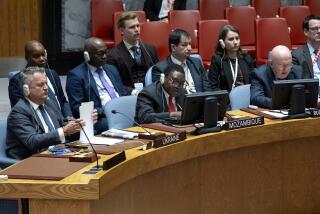International Human Rights Group Honors 9 Defenders of Justice
- Share via
In countries with only a tenuous hold on the rule of law, they are the agents of reason. They are the voices of the unfairly jailed. They speak out against judges who are the brazen instruments of dictators and in defense of ethnic minorities whom not even the police will protect.
This is the work of nine activists honored Thursday by the international group Human Rights Watch, men and women from seven countries who share a belief in simple justice and the courage to take on the powerful.
Shirin Ebadi, a 49-year-old woman and former Tehran judge, works as a lawyer in Iran despite the restrictions of Islamic law. Her work includes defending the rights of women against a government that sees them as legal nonentities.
Anyakwee Nsirimovu, a 33-year-old lawyer, has not shut down his human-rights office in the southern Nigerian city of Port Harcourt, despite repeated stints in jail. If he does, he asked, who would speak out against the tortures carried out by the police?
Three Bosnians--representing each of the country’s principal ethnic groups--head the office of a human-rights ombudsman that has investigated 17,000 complaints. In a country torn apart by nationalistic rivalries, they have been a model of cooperation.
“We decided from the beginning to start our work as a team,” Branka Raguz, a Bosnian Croat, said through an interpreter.
“We might be the only institution in our federation that is constituted of the three groups and that operates successfully. We are the example that shows that, although we come from three different nationalities, we can work together.”
The other Bosnians honored were Esad Muhibic, a Bosniak (Bosnian Muslim), and Vera Jovanovic, a Serb.
Also honored were Irene Fernandez of Malaysia, Krassimir Kanev of Bulgaria, David de Jesus Fernandez of Mexico and Mmatshilo Motsei of South Africa, who has worked to raise awareness about domestic violence and crimes against women.
Most of the honorees monitor human rights in countries without a free and independent press.
And during a visit this week to the offices of The Times, some could not pass up the opportunity to pepper a reporter with brochures outlining the many injustices they have worked tirelessly to document.
Kanev produced a copy of his journal “Obektiv,” which described the widespread incarceration and exploitation of Bulgarian children--especially those of the Roma, or “Gypsies,” an ethnic minority that has not fared well since the fall of that country’s communist government.
David Fernandez brought brochures on the deteriorating state of civil rights in Mexico.
A 39-year-old Jesuit priest who heads a Mexico City human rights center, Fernandez had traveled to the United States just days after receiving an ominous death threat.
No human rights award, the anonymous threat went, would protect him if he continued his work on behalf of victims of army and police abuse.
“The space of democracy and the liberty to act is getting smaller,” he said.
In a comment that was echoed by other honorees, the Bosnians complained about the almost complete absence of an independent judiciary in their country.
“We are working in very difficult conditions where there is no legal system and no basic safety, because the police are not responsible to the law and in many cases they are the ones violating the human rights of the people,” Raguz said.
Nsirimovu, of Nigeria, described the many frustrations he faced when arguing in court for the release of people illegally detained for alleged political activity.
“The judge will just look at you and smile and say, ‘My hands are tied.’ And you have no recourse to appeal.”
Ebadi recounted her struggles with an Iranian law that makes it almost impossible to seek charges against a man who kills a woman.
The law, she said, requires the victim’s family to pay a large fee to have the man prosecuted.
More to Read
Sign up for Essential California
The most important California stories and recommendations in your inbox every morning.
You may occasionally receive promotional content from the Los Angeles Times.














